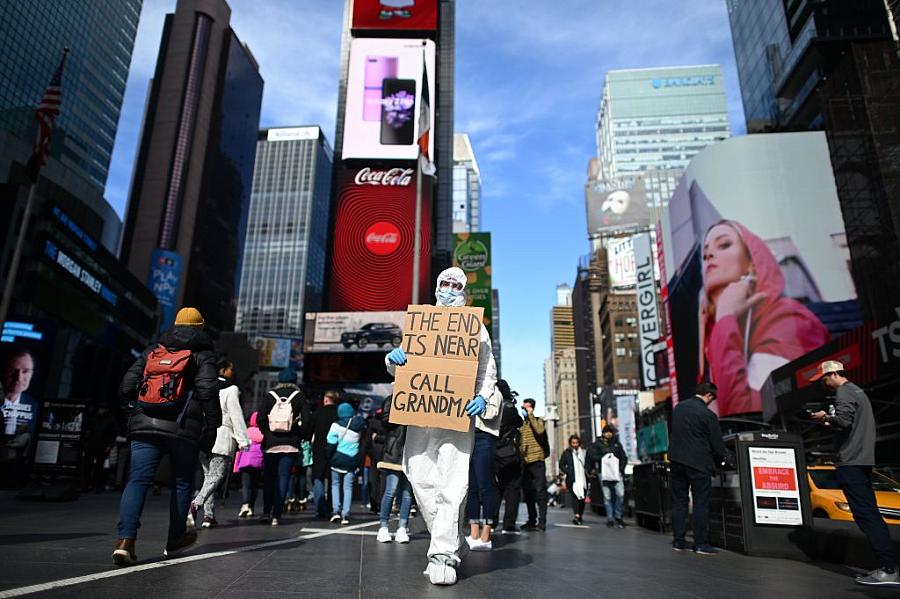As crisis mounts, researcher explains what lasting stress does to our bodies and biology

Our brains are evolutionarily primed to think about the short term during acutely stressful scenarios like this, UCSF stress researcher Alexandra Crosswell told reporters this week.
(Photo by Johannes Eisele/AFP via Getty Images)
Think of the brain, honed by millennia of evolution, as a powerful predictive machine, constantly scanning the horizon for signs of what’s to come. Like an eager young scout, the brain relishes the state of readiness.
But what happens when that future is shrouded in a thick fog of uncertainty? Or worse, when that veil conceals real threats to our safety and well-being that exceed our control?
That’s essentially the situation we all find ourselves in at the moment, UCSF stress researcher Alexandra Crosswell told reporters tuning in to the 2020 California Fellowship this week in the midst of the escalating coronavirus crisis.
Our long pre-history has primed our brains to think short-term during such acutely stressful scenarios, prompting us to prioritize our own survival and our close kin. But the trick, according to Crosswell, is to know our brains well enough to see this tunnel vision coming and try to override our reptilian wiring, choosing instead to focus on rational approaches to protect not just ourselves but our broader global community.
Of course, the empty toilet paper pallets at Costco and reports of barren grocery shelves suggest we haven’t quite got there yet. The primal brain isn’t so easily subdued.
But insights from Crosswell, an assistant professor of psychiatry at UCSF, and her colleagues help us better understand the ways in which our brains and bodies are besieged by all kinds of stress — from global pandemics to more routine experiences, such as caregiving for an elderly relative or constantly feeling unsafe in a high-crime neighborhood. The key takeaway is that there is now a solid body of science that shows stress corrodes our health all the way down to the cellular level, making us vulnerable to serious disease and even premature death.
“There’s very strong evidence linking the experience of psychological stress to disease risk,” Crosswell said, citing epidemiological evidence tying stress to everything from Type 2 diabetes to cardiovascular disease to cancer progression.
We also know stress tends to come in bundles — it’s not hard to imagine how money struggles, a dangerous neighborhood, discrimination and work stress could overlap, for instance. To study how these cumulative stressors shape health, Crosswell and her colleague Joshua Wiley at Monash University used a large U.S. cohort study to see how a cumulative index of stress might be tied to the risk of death. They found there was a 20% higher risk of dying over the following 11 years for people in the highest stress quartile compared the lowest quartile. (The study is currently under review.)
“The most important part of this finding is that we controlled in our analyses for everything that we knew to be related to your risk of dying,” Crosswell said. That greatly increased their confidence that stress is the culprit shortening life spans. It also puts the effects of stress in the same league as other known mortality risks, such as smoking and obesity.
So why don’t we hear as much about stress as a grave health risk as we do with smoking or obesity?
“One of the reasons we haven’t tackled this as a society is because it’s so difficult to reduce these experiences of stress, because they’re so multifaceted and such an essential part of our existence as humans,” Crosswell said.
That doesn’t mean stress affects everyone equally. If you have more money and resources, or if you live in a safe neighborhood and rarely experience discrimination, it’s easier to buffer yourself from many insidious forms of stress.
And we also know that age matters greatly. Sustained stress and trauma experienced during the vulnerable childhood years — often referred to as “adverse childhood experiences” (ACEs) — are particularly damaging and potentially lifelong. “There’s extremely strong epidemiological evidence linking greater number of ACEs to increased disease risk and mortality,” Crosswell said.
From the perspective of the body’s response — and in particular the activation of the autonomic nervous system — Crosswell says it doesn’t necessarily matter how real any given threat or stressor may be. One of the fundamental truths from the research on stress, Crosswell said, is that “our bodies are acting in preparation,” she said. “They’re constantly trying to figure out if there’s a threat in the environment. If yes, and whether it’s real or not, we’re going to prepare, and we’re going to respond.”
That suggests that making people feel safe and secure from real and perceived threats is a prime way to tamp down the constant activation of the body’s stress response system.
“We need to build communities where feeling safe is a priority — and that's because the parasympathetic nervous system is activated under conditions of safety, and our brains can calm down,” she said. “We don’t have to keep predicting that something negative is going to happen and have that stress response.”
She added, “I hope that we will take our research in a direction where we try to figure out how do we build physical spaces that make people feel safe.”
Crosswell’s research is part of a larger scientific shift away from genetic determinism towards a social and environmental understanding of the forces shaping health.
“The macro message that I hope my work shares is that the environment greatly matters,” Crosswell said. “As a scientific community, we used to think that, ‘Well, your genetics are just your genetics and that’s it.’”
This newer body of research is “showing that you have these stressors that can influence you all way down to the gene expression in your cells and that then means that love, connection, support, good schools, good families, kind neighbors — all of that can also change your biology.”
**

